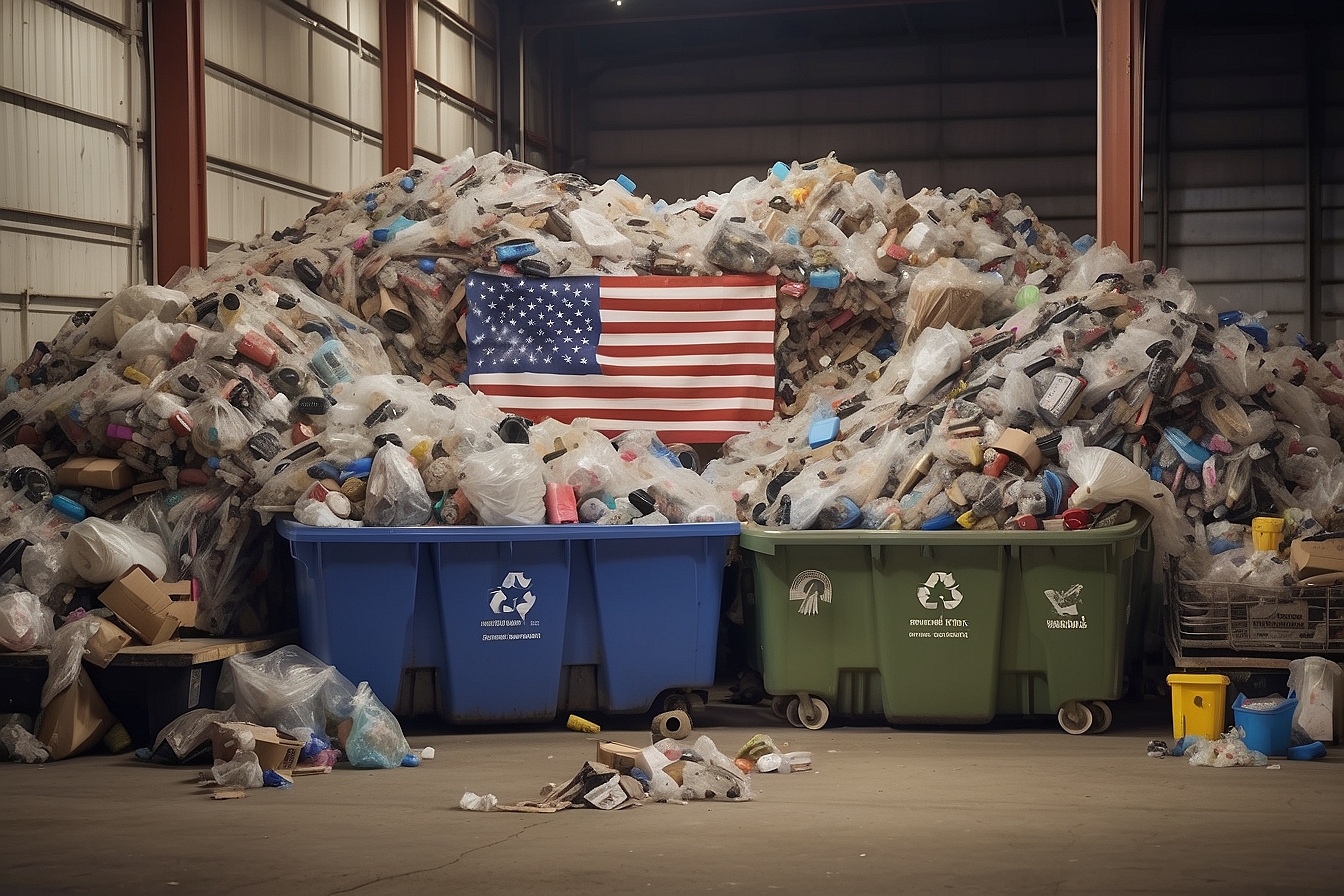We’ve all witnessed the unfortunate aftermath of poor waste management – our once clean streets now a canvas of discarded rubbish, a sight that does no favours for our dear planet and its diverse fauna.
Like you, this image troubles us deeply and spurs a relentless desire to drive positive change. Astonishingly, over 2 billion tonnes of municipal solid waste are amassed globally each year, underscoring an immediate need to act.
As we navigate this issue together, let’s delve into how community-involved efforts can effectively reverse the tides of our waste crisis. Join us as we uncover hands-on methods that communities can adopt to pave the way for a brighter and tidier future!
Key Takeaways
- Community – led initiatives encourage the collection and selling of recyclable waste, boosting local incomes and reducing environmental pollution.
- The 4R concept (reduce, reuse, recycle, recover) empowers communities to manage their waste efficiently while promoting sustainable living habits.
- Collaborative efforts between NGOs, government agencies, and residents lead to tailored and inclusive waste management solutions that address local needs.
- These initiatives result in cleaner environments with less pollution, reduced carbon footprints through recycling and reforestation activities.
- Participation in community – led waste management leads to economic benefits for locals by creating jobs and fostering green economies.
Types of Community-Led Waste Management Initiatives
Community-led waste management initiatives encompass buy-back arrangements for income generation and climate change mitigation, community-led litter management through the 4R concept, and collaborations between NGOs, government agencies, and impacted communities.
These initiatives aim to reduce waste pollution, empower local communities, and promote sustainable waste management practices.
Buy-back arrangements for income generation and climate change mitigation
We see the value in buy-back arrangements as a tool for both boosting local incomes and fighting climate change. These schemes encourage members of our community to collect recyclable waste, which companies then purchase from them.
This creates a circular economy, reducing litter and pollution while also giving residents an opportunity to earn money.
By selling plastics, metals, paper, and glass back into recycling systems, we’re taking real steps towards environmental sustainability. The process cuts down on raw material demand and reduces greenhouse gas emissions by limiting the need for new production.
As we engage more people in sustainable waste management practices through these programs, we not only clean up our surroundings but also inspire others to join us in making a difference.
Our commitment doesn’t stop here; we carry this energy forward as we explore other effective strategies like community-led litter management through the 4R concept.
Community-led litter management through the 4R concept (reduce, reuse, recycle, recover)
Community-led litter management involves implementing the 4R concept: reduce, reuse, recycle, and recover.
- Reduction: Communities can decrease the amount of waste produced through measures like packaging reduction and encouraging the use of reusable items.
- Reuse: Encouraging the reuse of items, such as donating unwanted goods or using refillable containers, helps minimise waste generation.
- Recycling: Establishing local recycling programmes and educating communities about the importance of separating recyclables contributes to sustainable waste management.
- Recovery: Implementing waste-to-energy programmes and supporting initiatives that convert organic waste into compost or biofuel helps recover resources from discarded materials.
Collaborations between NGOs, government agencies, and impacted communities
NGOs, government agencies, and impacted communities work together on waste management initiatives. They collaborate to implement sustainable solutions that benefit the environment and local residents.
The partnership fosters effective waste reduction policies, promotes community engagement in recycling programs, and empowers citizens to take ownership of their environmental impact.
Through these collaborations, NGOs bring expertise in waste management practices, while government agencies provide support through policy-making and infrastructure development. Impacted communities actively participate in decision-making processes and contribute local knowledge to create tailored waste management solutions.
Outcomes and Impacts of Community-Led Waste Management Initiatives
Community-led waste management initiatives have resulted in improved waste management practices, reduced waste pollution, positive impacts on the environment, and economic benefits for local communities.
These efforts have also led to reduced carbon emissions and reforestation.
Improved waste management practices and reduced waste pollution
Implementing improved waste management practices has resulted in a significant reduction in waste pollution within our local communities. By embracing the 4R concept of reduce, reuse, recycle, and recover, we have successfully minimised the amount of waste entering landfills and incinerators.
Through community-based recycling programmes and collaborative waste management projects with local government involvement, we’ve actively contributed to environmental sustainability while promoting civic-led waste-to-wealth activities.
Our grassroots waste management efforts have not only empowered local communities but also significantly reduced carbon emissions, contributing to reforestation efforts in our region.
Additionally, citizens’ active engagement in waste reduction initiatives has fostered an environment where community-driven waste management initiatives are now firmly established as part of our everyday life.
Positive impact on the environment, including reduced carbon emissions and reforestation
Community-led waste management initiatives have a positive impact on the environment by reducing carbon emissions and contributing to reforestation efforts. By promoting recycling and waste reduction, these initiatives help minimise the amount of waste that ends up in landfills or incinerators, subsequently lowering greenhouse gas emissions.
Additionally, community-based composting programmes contribute to reforestation by providing nutrient-rich soil for planting trees, which helps absorb carbon dioxide from the atmosphere.
Through active participation in local waste management programmes and advocating for sustainable practices, communities play a crucial role in mitigating environmental damage and fostering a healthier planet.
These grassroots efforts also encourage communities to take responsibility for their environmental footprint while inspiring others to adopt similar environmentally sustainable practices.
Empowerment and economic benefits for local communities.
Local communities experience empowerment and economic benefits through active participation in waste management initiatives. By engaging in recycling programs and waste reduction efforts, community members gain a sense of ownership over environmental sustainability practices.
These activities create employment opportunities, generate income through innovative recycling ventures, and promote local green economies. Additionally, community-led initiatives enable residents to develop valuable skills in waste management, fostering a sense of pride and self-reliance within the neighbourhood.
The adoption of civic-led waste to wealth activities not only contributes to environmental conservation but also enriches communities by promoting collective action towards a cleaner and more sustainable future.
Conclusion
Community-led waste management initiatives are crucial for promoting environmental sustainability and reducing waste pollution in our communities. Citizens play a pivotal role in driving these initiatives, from recycling programmes to litter management efforts.
By actively participating in waste reduction and reusing practices, local communities can create a positive impact on the environment while also improving their economic well-being.
Overall, community-driven waste management initiatives are essential for creating a cleaner, greener future for all.
FAQs
1. What are community-led waste management initiatives?
Community-led waste management initiatives are projects run by local groups that focus on reducing, recycling, and managing waste to help the environment.
2. How can communities participate in waste management?
Communities can get involved by starting or joining neighbourhood waste management programmes, setting up community-based recycling schemes, or taking part in clean-up projects.
3. What is zero-waste initiative about?
Zero-waste initiatives aim to eliminate rubbish and make sure everything we use returns safely to the ecosystem through reuse and recycling, not as pollution.
4. Can citizens really make a difference in waste management policy making?
Yes! Citizen-driven efforts often inspire new policies because they show how effective community participation can be for environmental sustainability at scale.
5. Why should people join community recycling programmes?
Joining a community recycling programme helps reduce landfill use, supports environmental stewardship within your area and promotes sustainable living practices amongst neighbours.





